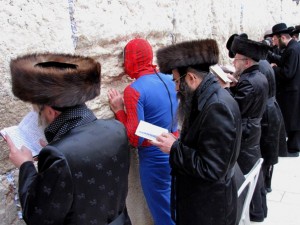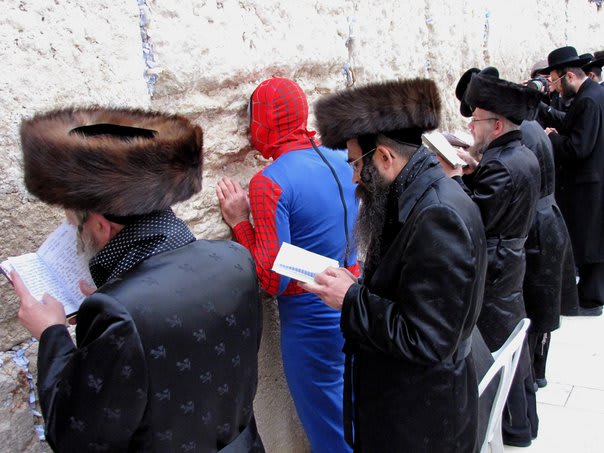(This is the final part of a three-part series. To read the second part of Rabbi Student’s discussion of the halachas of superpowers, click here.)
V. Shape Changing
 Some superheroes have the ability to alter their appearance, change their actual physical shape. Can someone with such power change his shape on Shabbos?
Some superheroes have the ability to alter their appearance, change their actual physical shape. Can someone with such power change his shape on Shabbos?
One concern is coloring. You are not allowed to change something’s color on Shabbos, including that of a person. Putting on lipstick, generally speaking, is a violation of this prohibition. Similarly, changing the color of your hair, eyes or skin by shape changing is also considered coloring on Shabbos.
If you maintain your body color, you still face another concern with shape changing–the Playdough question. Halakhic authorities forbid using Playdough on Shabbos for multiple reasons. One concern is smoothing (memarei’ach) the dough, which is forbidden. Others cite the prohibition against writing. The Chayei Adam (92:3) rules that you may not bake challah into specific shapes on Yom Tov. Even though you may bake, if you give the dough a specific shape–such as a fish–you violate the prohibition against writing on Yom Tov.
Initially, I found this application puzzling. How is baking a shape considered writing? After some thought, I look at it this way. Writing is generally a two-dimensional activity–letters on paper. However, placing three-dimensional letters next to each other is also a form of writing (setting the stage for the Scrabble question). If so, making a three-dimensional shape should also be similar to drawing a shape on a paper. Both are writing and forbidden on Shabbos and Yom Tov. With the advent of the three-dimensional printer, this comparison gains contemporary resonance. Some authorities sensibly apply this ruling to Playdough, as well.
I suspect that sculpting through shape changing is equivalent to sculpting with clay or dough. I cannot prove it but I believe that shape changing also constitutes writing on Shabbos. I encourage any superhero with the power to shape change to bring his questions to the highest halakhic authorities so we can have some heavy thinkers weigh in on the subject.
VI. Super Damage
The Hulk has anger management issues. He represents the rage that boils inside all of us. If we fail to control ourselves, we may end up destroying our lives and hurting others despite our best intentions. In his rage, the Hulk often inadvertently destroys private property. Is he liable to pay for his accidental damage?
The Torah (Ex. 21:24-25) tells us the concept of “an eye for an eye” in a long, repetitive fashion, also listing “a hand for a hand, a tooth for a tooth” and others, including “an injury (petza) for an injury.” The Sages of the Talmud and midrash inferred legal points from the repetition.
The Gemara (Bava Kamma 26b) learns from the phrase about “petza” that we are liable for even accidental damage. If we break it, even accidentally, we have to pay for it. However, the Mishnah on the very next page (27a) rules to the contrary. Someone who accidentally trips on a clay pitcher that was left in public, and breaks the pitcher, is exempt from paying damages. But isn’t that accidental damage for which the Gemara teaches we are liable?
Tosafos (Bava Kamma 27b sv. lefi) explain this apparent contradiction by distinguishing between a completely forced act (ones gamur) and an accident. Despite the biblical requirement to pay for accidental damages, you are exempt from an ones gamur. The Rambam (Mishneh Torah, Hilkhos Choveil U-Mazik 6:1) makes no such distinction and rules that you are liable for all property damage, even accidents. Later commentators are left to speculate how he resolved the contradiction.
The Shulchan Arukh (Choshen Mishpat 378:1) rules like the Rambam while the Rema (ad loc.) follows Tosafos. Therefore, according to the Rema, the Hulk would be exempt from paying for accidental damage if it constitutes an ones gamur. But does it? Is the Hulk really incapable of controlling his anger? From afar, it seems that he needs counseling for anger management. I find it hard to accept that his rage constitutes an ones gamur. On some level, he can be more careful and avoid reaching the state where he causes damage. On the other hand, perhaps I overestimate his ability to control his anger. Maybe he really has no control.
VII. Super Empowered
Regardless, there is another reason the Hulk may be exempt from paying for accidental damages. The Gemara (Sanhedrin 74a) discusses the case of accidental damage caused by an attempted murder. Somewhat surprisingly, the would-be murderer is exempt from paying for damages caused in his pursuit because he is liable for execution. Since a court can only apply one punishment, it uses the most severe, in this case execution.
The would-be victim who is fleeing for his life has every right to damage someone else’s property. If you are fleeing for your life and you see someone’s car with the door open and keys in the ignition, by all means jump in and drive away. Saving a life takes precedence over property rights. However, once the danger subsides, you have to pay for the damages you caused. If you crash that car, you have to pay the owner for the damage. He was just an innocent bystander.
However, a would-be rescuer is exempt from paying any damages. The Sages enacted a special exemption for rescuers. If not, people would hesitate before saving someone else’s life. Living in the litigious society of today, we can easily envision an emergency technician ripping open the shirt of someone writhing in illness in order to administer medicine. And then the patient, after having recovered, suing the emergency technician for damage to the shirt. In order to encourage the saving of lives, such heroes receive special exemption from paying damages. If you need to steal a car to pursue an assassin, you do not have to worry about paying for any damage to the car. Save the life.
This exemption applies to all superheroes. When superheroes fight supervillains, they cause super damage. Buildings are damaged. Cars are flattened. Businesses are destroyed. But as long as the superhero was fighting to save someone’s life, he is exempt from paying any damages. Therefore, the liability applied by Congress to superheroes in The Incredibles is not an obligation the Torah would support. Of course, you still have to follow local laws. But in principle, this is not legislation that Judaism would support.
On the other hand, the author Hatzalah Ke-Halakhah (ch. 7) warns emergency technicians not to overestimate the exemption. He quotes Rav Moshe Feinstein (Iggeros Moshe, Choshen Mishpat 2:63) who states that the exemption only applies to activities that are part of the life-saving efforts. If a car is blocking your ambulance, you can bang it out of the way. But if you have a clear path, you can’t bang another car just for fun. And if you are in someone’s home on an emergency call, you can’t steal from him and defend yourself with this exemption. It does not apply to theft.
Superheroes, and even regular heroes, are not above the law. If anything, they need the law more. They need to remember that despite their talents and achievements, they are mere servants of the Lord.
The words of this author reflect his/her own opinions and do not necessarily represent the official position of the Orthodox Union.
